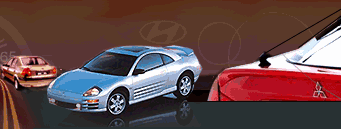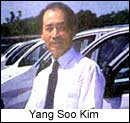

 |

|
|
Home >Money > Specials Part I: Madras, the Detroit of South Asia. Part II: Ford India MD on why the auto giant chose Madras. Part III: Hyundai MD says plans are on to make Madras operations' hub. |


 Hyundai Motor India's Managing Director Yang Soo Kim is gung-ho about what Madras has to offer. Hyundai Motor India's Managing Director Yang Soo Kim is gung-ho about what Madras has to offer.
In an exclusive interview to rediff.com's George Iype, the Hyundai Motor India chief elaborates how the company plans to make Madras the hub of the company's Asian and global operations. Excerpts:
Why did Hyundai Motor choose Madras as its investment destination?
Madras offers very good infrastructural facilities. It has an excellent port well suited for exports. The power supply in Tamil Nadu is the best.
The state government has been very industry-friendly. A full-fledged industrial park was made ready to facilitate growth in auto sector. Madras has also a very well established automobile ancillary industry. The city has a large number of engineering and technical institutes of repute. Therefore, availability of quality manpower is plenty. Tamil Nadu and especially Madras enjoys an excellent reputation for peaceful and harmonious industrial relations.
Are you satisfied with the infrastructure facilities and the Industrial climate in Madras?
We are definitely satisfied with the infrastructure facilities in Tamil Nadu. However, there is always scope for improvement. We feel that the national high ways should be widened to allow four/eight lane traffic.
Do you plan to convert your Madras plant as a hub of Asian operations?
Yes. Not just for Asian operations, but also for global operations. In fact, our completely built cars have already been exported from India to Algeria and Morocco and our engines are being exported to Turkey.
Have you ever felt at a disadvantage because your plant is situated in southern India unlike the country's biggest car maker Maruti which is based in North India?
Definitely not. We are very clear as to why we chose Madras. We crossed the magic figure of 100,000 cars in less than 19 months of commercial operation and became the second largest automobile manufacture in the country in less than 15 months. Though Madras-based, our market share in north has been consistently above 30 per cent. It is proof enough that we did not suffer any disadvantage because our plant is located in Madras.
Madras has more than 35 per cent of the auto components industry in India. Have you distribution and service networks from Madras been smooth?
We chose Madras because the city and its surrounding areas have the highest number of auto components industries in India. That has made our distribution network easier.
If the Indian government liberalises car import norms and allows free trade in used (second-hand cars), what will happen to the huge investments made in India by foreign automobile companies like you? Will you then stop launching new models regularly?
First of all, Hyundai Motor India does not see itself as a foreign auto-maker. We are an Indian company incorporated under the Companies Act of 1956.
The World Trade Organisation has been asking for lifting of quantitative restrictions on all imports including import of second hand cars. This means there will be no bound duty for import of second-hand cars and there lies a real and perceptible threat to the industry. However, we believe that with investments in excess of $12 billion in the automobile sector, the government will not take any hasty steps to endanger the automobile industry in the country.
Nevertheless, the fact remains that lifting of these import barriers will lead to a lot of anomalies and confusion in the Indian auto market.
According to you, what distinguishes the Indian car market from markets in the developed market?
A vast middle class whose purchasing power is on the increase. India is one of the very few growing automobile markets in the world. Liberalisation of the Indian economy in the 1990s also made India a very attractive proposition. Hyundai with its global expertise in automobiles decided to take advantage of this growing market. This is also the reason why Hyundai invested $614 million and set up a fully integrated automobile plant including facilities for manufacturing engines and transmission.
Have you benefited from the reforms in India? If yes in what way? Is there scope for further liberalisation?
It is because of the congenial atmosphere created due to reforms that we came to set up a fully integrated plant here. Reforms have helped to clear the foreign direct investment faster.
Can you relate the experience of doing business in India?
The experience has been very good and better than we expected. Our corporate philosophy of quality first, technology first, people first and customer first has suited Indian market very well. The concept of onsite management is one philosophy we follow very diligently.
Are you happy with the skills of the workforce in India?
We are quite happy with the skills of the Indian work force. More than 130,000 quality cars on Indian roads is proof enough of their skills.
What are the major challenges/obstacles ahead for the Indian automobile/car Industry?
High tariff like 40 per cent excise duty, permission to import second-hand (used) cars without restrictions are some of the issues that need attention. As far as the market forces are concerned, correct price and right technology would be two major issues that would determine success in the market place. Those who have set up only assembly units and are depending heavily on imported components would find the going tough. The government thus far has been moving in the right direction as far as passenger car industry is concerned.
What gave Hyundai Santro a head start in India?
Hyundai Santro stands for all that is latest in technology. And it fulfilled in vacuum in the market. The perception of the car as a family car with the latest technology on par with International standards gave us a head start in the Indian market. North has always been the biggest market for passenger cars in the country and Hyundai Santro is no exception.
|
|||
HOME | NEWS | MONEY | SPORTS | MOVIES | CHAT | INFOTECH | TRAVEL SINGLES | NEWSLINKS | BOOK SHOP | MUSIC SHOP | GIFT SHOP | HOTEL BOOKINGS AIR/RAIL | WEATHER | MILLENNIUM | BROADBAND | E-CARDS | EDUCATION HOMEPAGES | FREE EMAIL | CONTESTS | FEEDBACK |
||||